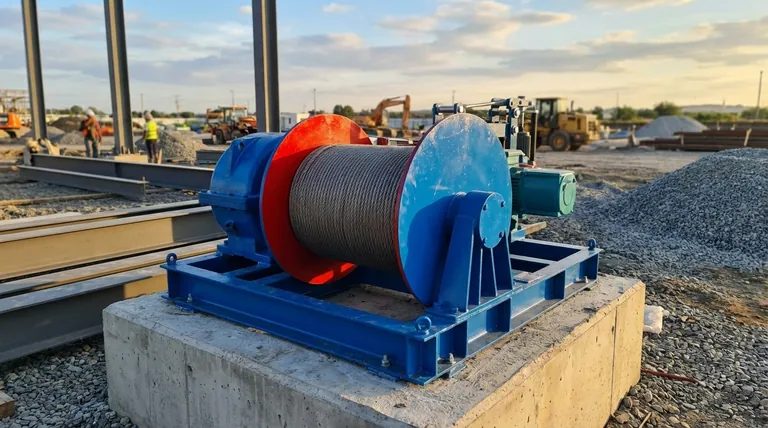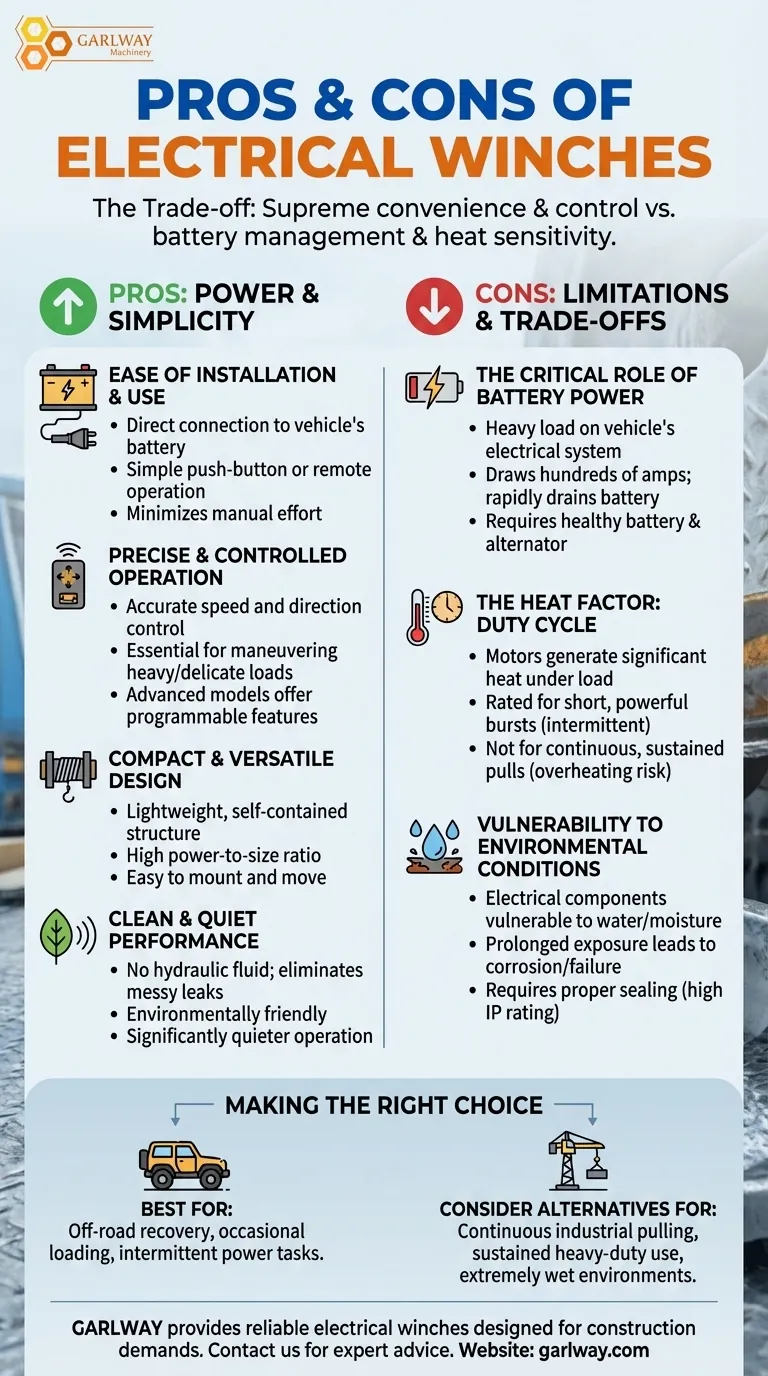At its core, an electric winch is a powerful and convenient tool that trades the complexity of hydraulic systems for a direct reliance on your vehicle's electrical power. This makes it exceptionally user-friendly and easy to install but also introduces specific limitations regarding its operational endurance and environmental resilience.
The decision to use an electric winch hinges on a simple trade-off: you gain supreme convenience and control for intermittent tasks, but you must manage its demands on your battery and its sensitivity to heat during prolonged use.

The Core Advantages: Power and Simplicity
Electric winches have become the standard in many applications for a clear set of reasons. They offer a blend of modern control, straightforward mechanics, and self-contained operation that is difficult to match.
Ease of Installation and Use
Unlike hydraulic systems that require engine-driven pumps and complex fluid lines, an electric winch connects directly to your vehicle's battery. This dramatically simplifies installation.
Operation is equally straightforward, typically managed with a simple push-button or remote control, minimizing the need for manual effort.
Precise and Controlled Operation
The electric motor provides exceptionally precise control over speed and direction. This accuracy is crucial for safely maneuvering heavy or delicate loads.
In more advanced industrial models, these controls can be programmed with variable speeds and specific stop positions, offering a high degree of automation and safety.
Compact and Versatile Design
Electric winches are known for their compact, lightweight, and self-contained structure. All primary components—the motor, gearbox, and drum—are integrated into a single unit.
This high power-to-size ratio makes them highly versatile and easy to mount on vehicles or move between job sites for various lifting and pulling tasks.
Clean and Quiet Performance
Because they run on electricity, these winches operate without the need for hydraulic fluid, eliminating the risk of messy and environmentally harmful leaks.
Their operation is also significantly quieter than engine-driven hydraulic systems, which is a major benefit in many work environments.
Understanding the Trade-offs and Limitations
The simplicity of an electric winch is also the source of its primary constraints. Understanding these limitations is critical to using the tool safely and effectively.
The Critical Role of Battery Power
An electric winch places a heavy load on the vehicle's electrical system. During a demanding pull, it can draw hundreds of amps, rapidly draining a battery if the engine is not running to power the alternator.
This dependency means the health of your battery and alternator is paramount. A weak electrical system will directly result in poor winch performance.
The Heat Factor: Duty Cycle Explained
Electric motors generate significant heat under load. To prevent overheating and permanent damage, they are rated for a specific duty cycle—a ratio of their maximum run time to their required cool-down time.
This makes most electric winches ideal for short, powerful bursts of work, like vehicle recovery. They are not designed for the continuous, sustained pulls common in industrial or logging applications, where a hydraulic winch would excel.
Vulnerability to Environmental Conditions
While many winches are built to be weather-resistant, their electrical components—such as the motor and solenoids—are inherently more vulnerable to water and moisture than a sealed hydraulic system.
Without proper sealing (indicated by a high IP rating), prolonged exposure to wet or muddy environments can lead to corrosion and electrical failure.
Making the Right Choice for Your Goal
Your intended application dictates whether the advantages of an electric winch outweigh its limitations.
- If your primary focus is off-road recovery or occasional loading: An electric winch is the ideal choice for its on-demand power, simple installation, and ease of use.
- If your primary focus is continuous industrial pulling or use in extremely wet environments: You must prioritize models with a high duty cycle rating and superior weather sealing, or consider a hydraulic winch for its thermal endurance.
Ultimately, understanding how an electric winch works empowers you to select the right tool and operate it with maximum effectiveness and safety.
Summary Table:
| Aspect | Pros | Cons |
|---|---|---|
| Power & Control | Precise, variable speed control; easy push-button operation. | High battery drain; requires a strong vehicle electrical system. |
| Installation & Use | Simple, direct connection to battery; compact and versatile. | Not ideal for continuous, prolonged pulling due to heat buildup. |
| Durability & Environment | Clean operation (no hydraulic fluid); quiet performance. | Electrical components can be vulnerable to water/moisture without proper sealing. |
| Best For | Off-road recovery, occasional loading, and tasks requiring intermittent power. | Applications requiring sustained, heavy-duty pulling in wet conditions. |
Ready to Power Your Projects with the Right Winch?
Understanding the pros and cons is the first step. GARLWAY specializes in providing robust construction machinery solutions, including reliable electric winches designed for the demands of construction companies and contractors globally.
We can help you:
- Select the perfect winch for your specific application, whether it's for vehicle recovery or job site lifting.
- Ensure maximum performance and longevity with equipment built to withstand tough conditions.
- Streamline your operations with our full range of products, including concrete mixers and batching plants.
Don't leave your equipment choice to chance. Contact our experts today for a personalized consultation and discover the GARLWAY difference in power, reliability, and support.
Visual Guide

Related Products
- Electric Hoist Winch Boat Anchor Windlass for Marine Applications
- Electric and Hydraulic Winch for Heavy Duty Applications
- Heavy Duty Electric Boat Winch Windlass Anchor
- Electric 120V Boat Winch by Badlands
- Best 18000 Pound Drum Anchor Trailer Winch
People Also Ask
- What are the key components of an anchor windlass system? A Guide to Safe & Efficient Anchoring
- What problems can occur with traditional windlass winches? Avoid Chain Jams & Rope Wear
- How do hydraulic winches assist in agriculture and farming? Boost Power & Reliability for Your Farm
- How do electric hoists help prevent workplace injuries? Engineer a Safer, More Efficient Workspace
- How often should you service a winch? A Proactive Guide to Reliable Performance
- How does an electric winch convert energy? From Electricity to Powerful Pulling Force
- How strong of a winch do I need for my boat? Get the Right Pulling Power for Trailering & Anchoring
- What is the difference between a windlass and winch? Choose the Right Tool for Your Vessel



















